
The days were lengthening, and in only a week they would again be longer than the nights. Spring was almost upon them. Already a man would start thinking about his supper even before the sun had gone down, and it was supper that had been on Sir Aengus’s mind at that twilit moment when his horse had spooked and shied.
Now, as he opened his eyes, he found that night had fallen, and a miserable, dank, cold, and airless night it seemed. The world would still be in the clutch of winter for another seven days.
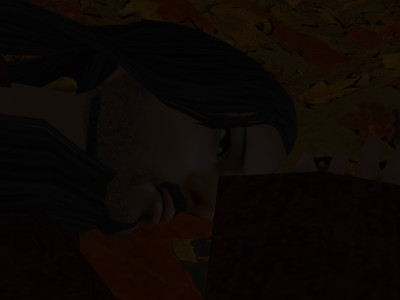
For his part, Aengus was miserable, hungry, cold, and aching. He remembered his horse rearing; he remembered going up into the air. However, strangely, he did not remember falling. He certainly did not remember hitting the ground, but he thought it must have been quite a blow to have knocked him out cold for hours and to leave him with such pain in his head and spine.
For one terrifying moment as he began to move, he believed that he could not feel his legs. Then he heard them rustling in the dry leaves, and he felt their aching, too. He understood that they were only numb and half-paralyzed from lying so long on the cold ground.
Once he had reassured himself of his body, another terror came upon him. He was lying on a bed of leaves and litter, but he was not in a forest. It was not merely the night that was dank and cold and impossibly dark. His wakening body knew by instinct that he was underground.

With the instinct of a surface-dwelling creature, he looked up in search of light. There, far above him, were cracks in the darkness. They admitted only a glimpse of sky, startlingly blue against the dark. He could just make out the form of his hand before his face by the glow of an unseen full moon.
He sat up and felt over his body. His sword was still at his side, and he had all of his knives. He also had the pouch he wore at his belt, and so he could make a fire or at least fashion a simple torch if he could find a piece of wood.
He began dragging his hands over the ground around him, almost blindly, but there were only leaves and small bits of twigs and bark nearby. Then he lifted his head to look out beyond the reach of his arms.
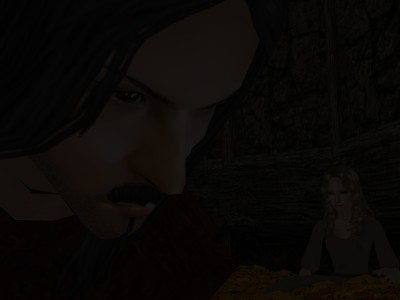
Aengus cried aloud. There was a pale form before him, with dark patches that he imagined to be eyes and a mouth. Its utter stillness told him that it was a cadaver.
Though it could not harm him, the shock of meeting death face-to-face was more terrifying than the sight of a potential enemy. Aengus pushed himself to his feet and stumbled back into the dark unknown behind him.
“The devil!” he swore and stomped his foot in his anger at himself for having been afraid. The sound of his own voice comforted him, and he went further by crossing himself and repeating a quick prayer.

But as he grew calm, he realized that the discovery of a body in this pit could only be a bad sign for him. It meant that someone else had fallen in and had not been able to climb out again. If the body was sitting up, as it seemed to be, it meant that the someone else had not died merely from the fall.
Aengus began creeping closer to it, straining his eyes against the dark – and then it moved.
Aengus cried out and leapt backwards again, but this time he did not dare swear aloud, nor even breathe. The other bounded to its feet and squeaked, “You – see?”
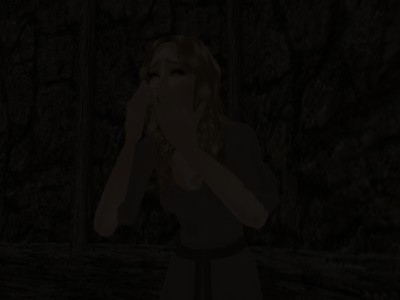
It was only a woman – a living woman. Aengus let out his breath again.
“The devil! What were you doing all this time? Watching me? Why didn’t you say something?”
The woman did not respond, and indeed she seemed to be cringing away from him in the dark.
“Don’t be afraid of me,” he said more gently. “I’m Sir Aengus. One of the King’s knights. How did we get down here? Please, help me find a branch or something I can light, so we can see.”

“See?”
“Aye! I can’t see in the dark, can you?” he sighed. “Help me, here. Is there anything around you we could burn? I need some wood.”
“Wood?”
“Aye, a branch or something,” Aengus muttered and began digging through the litter with the toe of his boot. “What’s that?”
He was distracted by the stubby branch he had found, and then the others around it. He kneeled and began raking them together. “I shall at least get us a fire started. How long have – ”
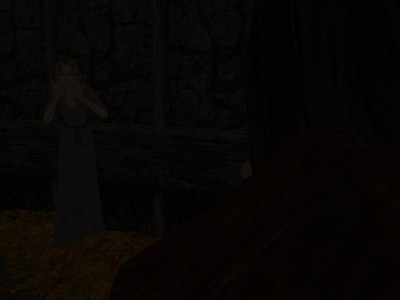
“Fire?”
“Aye, for the light. I want to see how we can get out of here. Don’t you?” She did not answer, so he went on. “How long have we been down here? Or you, or I? What’s your name? I’m Aengus. Did I tell you already? Are you listening?”
Still she did not answer, so he grunted and continued working on his fire in silence. As the tinder began to smoke and flare, he was able to see that they were in some sort of manmade structure, perhaps the foundation of a ruined building.
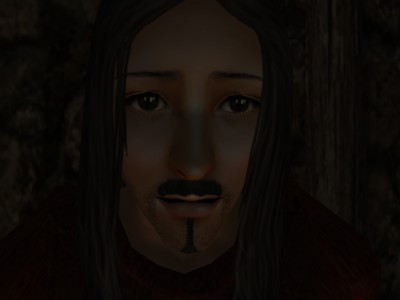
Far overhead was a roof of many wooden beams, tightly spaced, and it was through these that he could see the sky in places. And yet he knew that they were underground, at least in a manner of speaking, for in other places the shaggy roots of trees grew through the ceiling.
The young woman was still cowering against the far wall, and he spoke soothingly to her again.
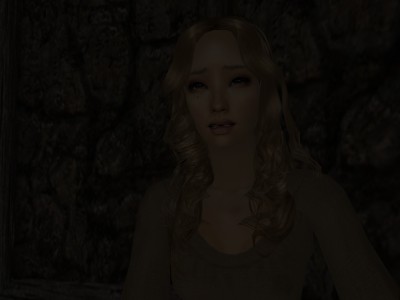
“Don’t be afraid. Let me get a fire started, and then we shall see how we might get out of here again. I – ”
Thinking even as he spoke of how they might escape, Aengus looked to his right, and at the sight he fell silent in despair. There was a dead body indeed, sitting up as he had feared. It had been sitting up so long that there was nothing but a moldy skeleton left, half-buried in a pile of dirt and leaves.
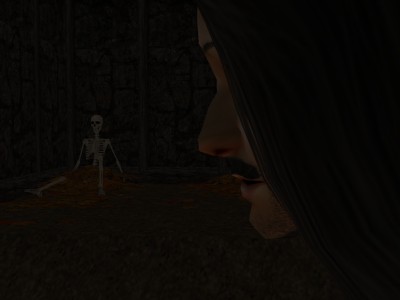
But he and the woman were two. “If you stand on my shoulders,” he said, “I might be able to lift you out of here, and you can go for help. Please, don’t be afraid.”
“Fire?” she whispered. He realized that she was only wearing a simple, short-sleeved dress, and she must have been quite cold.
“Aye, fire. Come here and warm yourself up. You’re not even dressed. Come.”
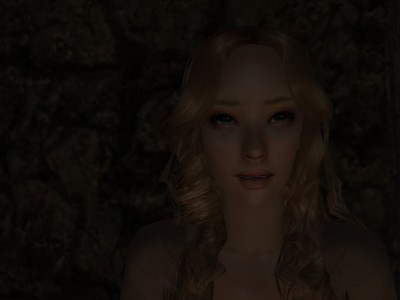
“Fire?” She tottered closer to him and to the fire.
“Aye, come along. What’s your name?”
“You see Lena?” she asked slowly. He wondered suddenly whether she were feeble-minded, or perhaps only stunned from hitting her head in her fall.
“Is that your name?” he asked her. “Lena?”
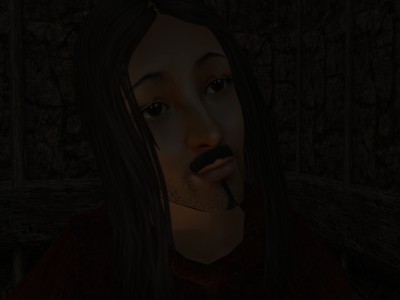
“Lena… elf.”
“Elf! The devil!” he cried and leapt away from her. He hadn’t considered that possibility at all. “I don’t like this one bit! Is this your idea? Did you trap me here?”
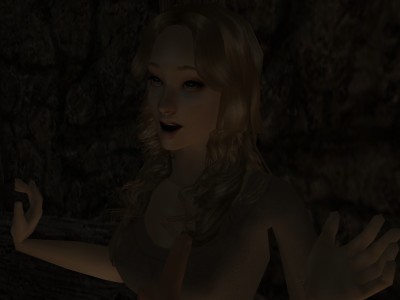
She seemed frightened by his agitation, so he spoke gently again. “Listen, Lena-elf…”
He recalled that Egelric’s Sela had sometimes called herself Sela-elf, and so had Egelric come to call her. He remembered too that Sela had been a gentle, harmless girl. She had not been one of the haughty, dangerous elves with whom his cousin Malcolm had recently had affair. Perhaps, he thought, this girl was another such as Sela.

“Did you know Sela?” he asked. “Sela-elf?”
“No Sela-elf. Lena-elf. Lena Lena.”
“I see.”
“You see Lena-elf.”

“That’s right,” he smiled. Egelric sometimes came up with strange, ungrammatical sayings, and at those times one knew he must have been quoting Sela. “You like fire, don’t you?” he asked. “‘It is fire for you?’”
“It is fire, fire for you,” she said.
“Anyway, that’s fire for us,” he said as the fire began burning properly.
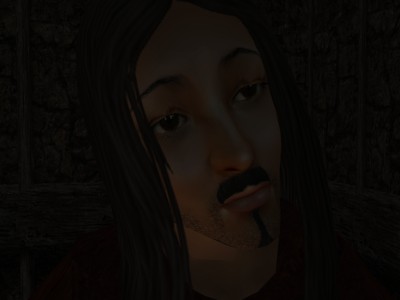
Now that he could see well enough not to stumble, he walked around the chamber, looking up in search of the hole through which he and she had fallen. He saw nothing large enough for a man, but there were snarls of roots and dead plants in enough places to make it possible that they hid a larger hole in the beams through which he might have slipped.
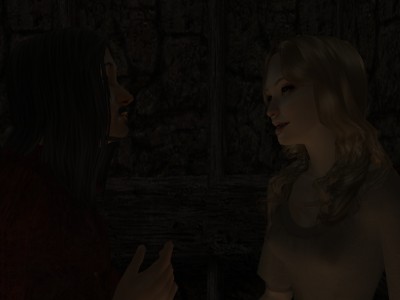
“Do you suppose you could climb onto my shoulders?” he asked her, patting his shoulders. “If I held you up, you might be tall enough to reach the ceiling.”
She did not seem to understand.
“You,” he said, pointing at her, “climb on my shoulders,” pantomiming the action, “to go up. Up!” He pointed at the ceiling.

“No, no it is up for you, for me. It is… it is…” She turned to point at the body behind her. “It is for you, for me,” she whimpered, and her pretty mouth began to tremble.
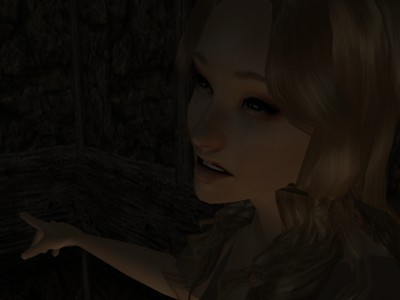
“Nonsense!” he cried cheerily.
He might at least reassure her, and he knew that one often reassured oneself in so doing.
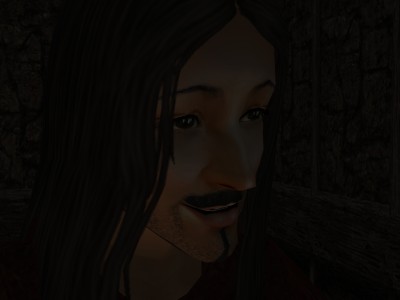
“We are two, and I fancy we are both more clever than that poor fellow. Perhaps he broke his leg or something. And my friends, at least, will be looking for me if I don’t come home tonight, and they will surely be looking along the path outside.”
She could not have understood his words, but she nodded at him and attempted to smile. She understood what he meant her to understand.
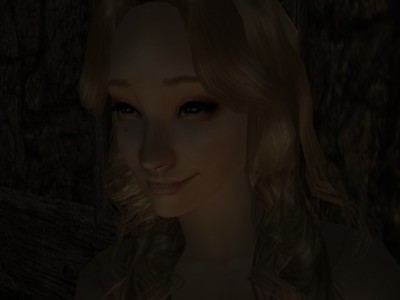
“So! Tomorrow they will be looking for us, if not already tonight, and meanwhile you and I shall try to find our own way out. But I think we won’t spend more than a night down here. Hmm? It is up for you, up for me?”

He thought he could see the rapt, uncertain soul of a wild animal peering out at him from behind her eyes. He had spoken only to calm her, never meaning the words to bear such import, but she hesitated before them like a wild animal wondering whether to risk taking food from a man’s hand. She seemed to think her response would matter greatly, would decide everything for her, or for both of them.
Her hand darted out to touch his sleeve, as if it mattered too that they touch. “It is up, up for man, for Lena-elf!” she agreed.
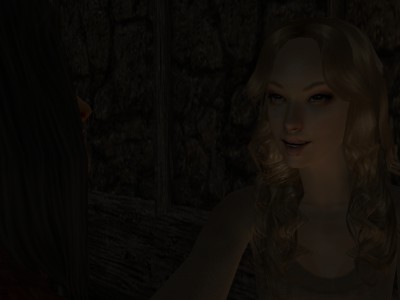







Aengus hè... And another Elf. Is she another Kisór?
You've got my mind wondering again Lothere!